Brewing Revolt Against Control & Command CBSE
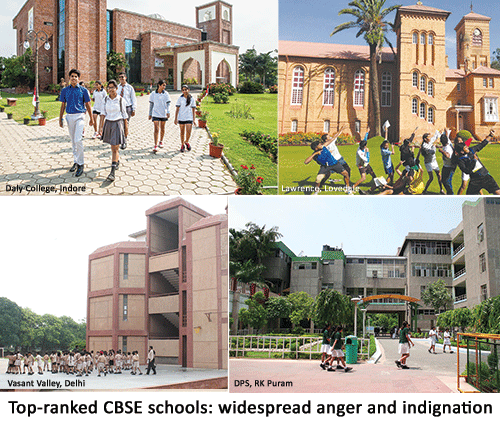 There’s growing disaffection within the communities of promoters, principals, teachers and parents of primary-secondary schools affiliated with the Delhi-based Central Board of Secondary Education (CBSE) — India’s largest national school-leaving (classes X and XII) examinations board which has 18,006 affiliated schools with an estimated 30 million students countrywide.
There’s growing disaffection within the communities of promoters, principals, teachers and parents of primary-secondary schools affiliated with the Delhi-based Central Board of Secondary Education (CBSE) — India’s largest national school-leaving (classes X and XII) examinations board which has 18,006 affiliated schools with an estimated 30 million students countrywide.
In recent months, a spate of circulars and directives has emanated from the board’s headquarters in Preet Vihar, New Delhi, which has generated confusion in affiliated schools attended by children of the country’s influential upwardly mobile middle class. They have aroused apprehension of severe erosion of institutional autonomy, especially within stakeholders of widely admired affiliated private unaided (financially independent) schools.
Although CBSE, established in 1962 essentially for children of the country’s civil servants, includes the 1,113 Central government-promoted Kendriya Vidyalaya (KVs) day schools and 587 Jawahar Navodaya Vidyalayas (JNVs — free-of-charge class VI-XII boarding schools for meritorious rural students) as well as less prestigious government schools in Delhi state among its 18,006 affiliated primary-secondaries, over the past six decades, promoters of 13,657 private schools countrywide have signed up with CBSE rather than the rival Delhi-based Council for the Indian School Certificate Examinations (CISCE). Among them: Welham Boys, Welham Girls (Dehradun), the Lawrence schools in Sanawar and Lovedale (Ooty), Daly College, Indore and the 335 Delhi Public Schools (DPS) chain owned and franchised by the Delhi-based DPS Society (estb.1949).
While government schools tend to quiescently accept CBSE’s often arbitrary and contradictory fiats and diktats, promoters and managements of private unaided schools which opted to affiliate with the professedly autonomous CBSE, which is under the jurisdictional purview of the Union ministry of human resource development, are becoming increasingly perturbed by several directives issued by the CBSE top brass in recent months. On December 20, 2016, the board readily endorsed a proposal of the Union HRD ministry to restore the mandatory status of the class X exam for all affiliated schools, revoking its own directive of 2009 when under the influence of Kapil Sibal, then Union HRD minister of the Congress-led UPA-II government, it decreed the board’s high school-leaving exam optional for class X students. The CBSE management’s pliant reversal of its earlier decision to make the class X exam compulsory in all affiliated schools, has reinforced popular sentiment that in reality, this professedly autonomous examination board is a willing handmaiden of any HRD ministry incumbent and the ruling party at the Centre.
While there is a good argument for restoration of the compulsory class X exam — the substitute continuous and comprehensive evaluation (CCE) system having failed due to inadequate teacher preparation — other recent firmans of the CBSE management have aroused widespread anger and indignation among private unaided schools affiliated with India’s largest national school education board. On December 21, the governing body of the board issued an affiliation bye-law circular changing the composition of the selection committee for recruiting heads of affiliated schools.
Whereas formerly, the selection committee was an internal affair under Rule 25.2 (a) and comprised the president of the promoter society, chairman of the school’s managing committee, an educationist nominated by the managing committee and a person with experience of school administration nominated by the managing committee, the December 21 amendment required the nominated educationist to be appointed in consultation with CBSE. Moreover, under the amended bye-law, the board added a nominee of chairman, CBSE and a “nominee of the state government as per State Education Act” to the schools’ selection committees. And just to make it clear to affiliated schools that their principals would be subject to government approval, an explanatory rider to the amended Rule 25.2 (a) states that the “recommendations of the selection committee shall invariably have the concurrence” of the CBSE chairman’s nominee and the state government.
The CBSE’s plain intent to expand its control and ensure that individuals of its choosing are appointed principals of affiliated private independent schools, was reiterated the very next day when the board issued another circular on December 22 stating that “the Board has decided to conduct the Principal Eligibility Test (PET) for aspiring teachers to become principal and for existing (sic) principals, who fulfil the minimum qualifications of Principal as laid down in Rule 53 (1) of the Affiliation Bye laws of the Board. This amendment shall not be applicable to principals of Government schools”. Copies of the circular signed by Jaiprakash Chaturvedi, deputy secretary (affiliation) of CBSE, which promised that the “eligibility and modalities for introducing PET will be notified by the Board in due course of time”, were sent to principals and “managers” of all private unaided affiliated schools.
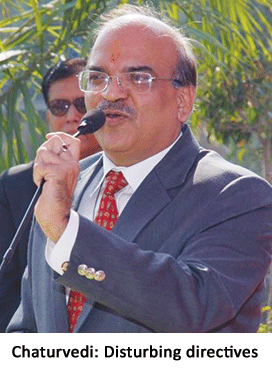 The steady expansion of the administrative powers of the CBSE — essentially a proxy of the Union HRD ministry — by constantly tightening its affiliation bye-laws has aroused anger and indignation within the growing community of affiliated privately-promoted schools. But because the country’s most reputed and top-ranked higher education institutions including the IITs, AIIMS, Indian Institute of Science, IIMs, Delhi University etc are owned and/or managed by the Central government, the popular belief — contested by its rival CISCE which has 2,190 private schools countrywide affiliated with it — is that the CBSE secondary and higher syllabuses/curriculums are more closely aligned with the highly competitive entrance exams of government higher ed institutions.
The steady expansion of the administrative powers of the CBSE — essentially a proxy of the Union HRD ministry — by constantly tightening its affiliation bye-laws has aroused anger and indignation within the growing community of affiliated privately-promoted schools. But because the country’s most reputed and top-ranked higher education institutions including the IITs, AIIMS, Indian Institute of Science, IIMs, Delhi University etc are owned and/or managed by the Central government, the popular belief — contested by its rival CISCE which has 2,190 private schools countrywide affiliated with it — is that the CBSE secondary and higher syllabuses/curriculums are more closely aligned with the highly competitive entrance exams of government higher ed institutions.
Consequently the majority of middle class parents believe that school-leavers from CBSE schools have an edge over students from non-CBSE schools. Therefore the managements and parents of CBSE schools are reluctant to publicly speak up against incremental interference of CBSE bureaucrats — the executive chairman of the board is usually an IAS officer — in the administrative affairs of affiliated schools for fear of harassment and disaffiliation.
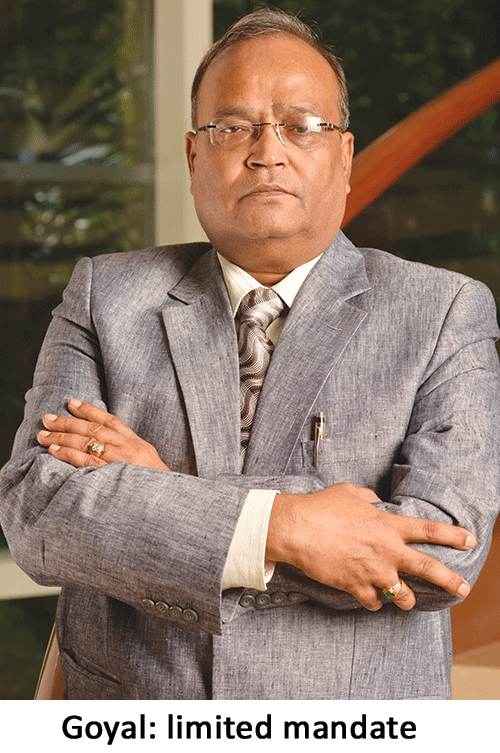 However, the formidable government-backed reputation of CBSE hasn’t fazed Damodar Goyal, the Jaipur-based president of the Society for Unaided Private Schools of Rajasthan. In 2010 under the aegis of the society, Goyal filed a writ petition challenging s. 12 (1) (c) of the landmark Right of Children to Free & Compulsory Education (aka RTE) Act, 2009 which shifted a part of the constitutional obligation of the State (Central and state governments) to provide compulsory free-of-charge education to all children nationwide aged between 6-14, to private independent schools. Although in Association of Unaided Schools of Rajasthan vs Union of India & Anr (2010), a three-judge bench of the Supreme Court upheld the constitutional validity of s. 12 (1) (c), it exempted minority and boarding schools from its ambit, resulting in a partial victory for Goyal.
However, the formidable government-backed reputation of CBSE hasn’t fazed Damodar Goyal, the Jaipur-based president of the Society for Unaided Private Schools of Rajasthan. In 2010 under the aegis of the society, Goyal filed a writ petition challenging s. 12 (1) (c) of the landmark Right of Children to Free & Compulsory Education (aka RTE) Act, 2009 which shifted a part of the constitutional obligation of the State (Central and state governments) to provide compulsory free-of-charge education to all children nationwide aged between 6-14, to private independent schools. Although in Association of Unaided Schools of Rajasthan vs Union of India & Anr (2010), a three-judge bench of the Supreme Court upheld the constitutional validity of s. 12 (1) (c), it exempted minority and boarding schools from its ambit, resulting in a partial victory for Goyal.
However since ‘minority schools’ can be defined by the native vernacular language or religion of their promoters, the exemption has become a major loophole through which a large number of much-prized (by the public) private unaided schools are escaping from s. 12 (1) (c). Hardly surprising since unfairly, s. 12 (2) of the RTE Act requires government to reimburse private schools admitting children under s. 12 (1) (c), tuition fees equivalent to what it (the Central, state or local government) spends per child in its own schools, invariably a fraction of the tuition fees payable by parents of other children.
Be that as it may, this time round Goyal, like most principals, managers and stakeholders of the country’s beleaguered 320,000 private schools — which, it is pertinent to note, host 40 percent of the country’s in-school children and discharge their obligations with far greater responsibility than principals and teachers in 1.20 million Central and state government schools nationwide — is outraged by the volley of circulars issued by R.K. Chaturvedi, a career IAS bureaucrat of the Madhya Pradesh cadre who was directly appointed chairman of CBSE by the appointments committee of the Union cabinet for a term lasting until 2020, last July Chaturvedi succeeded pro tem chairperson Satbir Bedi, who succeeded Vineet Joshi, an IAS officer of the Assam cadre who loyally served the Congress-led UPA government during its two terms (2004-14) at the Centre.
“Under its charter, CBSE’s mandate is to license schools to prepare their students for the board’s school-leaving high and higher secondary exams. As such, it has a limited mandate to also prescribe the classes IX-XII syllabus, stipulate teacher qualifications and lay down infrastructure guidelines. But over the past decade it has suo motu transformed itself into a regulatory body which is increasingly interfering with the administration of affiliated private schools, prescribing the pay and service conditions of teachers, determining the composition of their management committees and the superannuation age of principals and teachers. This was expressly proscribed by the Supreme Court in the T.M.A. Pai Foundation Case which expanded the fundamental right of minorities to establish and administer educational institutions of their choice to all citizens, subject to admissions being on merit and their not levying capitation fees. Therefore CBSE has no right to interfere with the school-teacher/principal relationship which is a master-servant relationship governed by the law of contract. Over the past several decades, CBSE has also expanded its senior school affiliation powers to cover classes I-VIII through coercion,” says Goyal.
The Association of Unaided Schools of Rajasthan vs Union of India & Anr (writ petition (civil) No. 6510 of 2013) filed in the Delhi high court elaborates: “It is respectfully submitted that CBSE cannot prescribe the composition of the School Management Committee and put its nominee in the School Management Committee, which is a direct encroachment in the autonomy of the unaided private schools as per the apex court’s judgement in the TMA Pai Case.”
Composition of the management committee apart, the petition also challenges the constitutional validity of clause 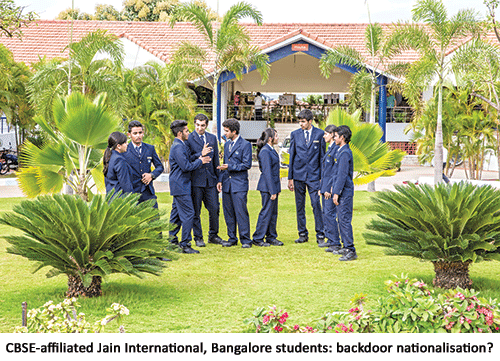 24 (1) & (2) of Chapter VII of CBSE’s affiliation bye-laws which empowers the board to lay down service conditions of school employees. “The board cannot provide or thrust service conditions designed by it upon private unaided schools as it is an interference in the right of private unaided schools to appoint its employees which includes the right to decide the salary and service conditions as laid down by the Hon’ble Supreme Court in the matter of TMA Pai Foundation Case. This provision is therefore liable to be struck down being ultra vires,” it says (para 66).
24 (1) & (2) of Chapter VII of CBSE’s affiliation bye-laws which empowers the board to lay down service conditions of school employees. “The board cannot provide or thrust service conditions designed by it upon private unaided schools as it is an interference in the right of private unaided schools to appoint its employees which includes the right to decide the salary and service conditions as laid down by the Hon’ble Supreme Court in the matter of TMA Pai Foundation Case. This provision is therefore liable to be struck down being ultra vires,” it says (para 66).
In other paragraphs the petition also challenges the right of CBSE to prescribe membership of “selection committees” to appoint the headmaster/principal and teachers and all staff except Group D employees. In addition, the writ petition challenges the right of the board to mandate the retirement age of principals of affiliated private unaided schools at 60 and audit their accounts.
“The Central Board of Secondary Education was constituted with the object of creating a body for conducting examination at the secondary stage of education… wherein the role of the board comes into play in conducting the (class) X & XII board examinations. CBSE has no jurisdiction much less competence, to lay down any guidelines in respect of school education below class IX i.e, in respect of classes nursery to VIII and hence the impugned bye-laws are liable to be declared ultra vires as being beyond competence and any authority of law,” says the petition of the Association of Unaided Schools of Rajasthan.
In this connection it’s important to note that the petition of the association was filed in 2013. Therefore, it’s a measure of contempt the CBSE mandarins have for the managements of affiliated independent schools that almost four years later, even as the Rajasthan association’s writ petition is pending hearing in the Delhi high court, on December 21 last, it issued a circular CBSE/Aff./Circular/6/2016 amending its bye-law 25.2 which prescribes composition of the selection/recruitment committees for appointment of all except Group D employees. According to the amendment, every private affiliated school’s recruitment/selection committee must include a nominee of the CBSE chairman and a representative of the state government, both with veto powers.
In effect, promoters of private unaided/independent schools will have no say in the appointment of the principal and perhaps even teachers, and senior administrators in institutions promoted with their own funds and savings. Given that CBSE is under the supervision and jurisdiction of the Union HRD ministry, this is tantamount to backdoor nationalisation of all private schools affiliated with CBSE. This bye-law flies in the face of the 11-judge Supreme Court verdict in the T.M.A. Pai Foundation Case (2002) which acknowledges the fundamental right of all citizens to engage in the ‘occupation’ of education and establish and administer education institutions of their choice.
According to some reports in the media, the two circulars issued on December 21/22, changing the composition of the management and selection committees and requiring all principals to write an eligibility test, have been “kept in abeyance” and perhaps withdrawn following a massive united protest of independent CBSE schools. Nevertheless, it is indicative of the control-and-command mindset of the CBSE and HRD ministry top brass who seem determined to ensure that the spirit of liberalisation and deregulation of 1991 which has galvanised Indian industry, doesn’t percolate into the education sector, never mind the pathetic condition of government schools and judgements of the apex court. Little wonder, eminent K-12 educationists who have transformed several private CBSE schools into the country’s most admired primary-secondaries, are outraged.
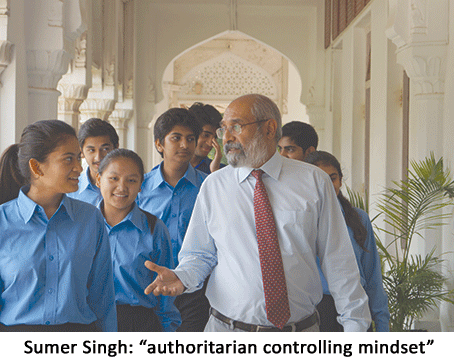 CBSE is essentially an examinations board, but by framing authoritarian bye-laws, it is getting into every area of school management. Some of its recent diktats defy all logic. For instance despite a chronic shortage of experienced principals and teachers, it has decreed that they must retire when they attain the arbitrarily fixed age of 60 unless they have received a national award from the President of India. I believe this is an infringement of the fundamental right of citizens to carry on a business, trade, profession and occupation. Moreover the board has made the learning of Sanskrit compulsory for all children until class X as against class VIII hitherto, without consulting any representative body of CBSE schools. The chairman of CBSE is appointed by the HRD minister who is appointed by the prime minister. The recent circulars of the board to introduce a Principal Eligibilty Test, change the composition of the management committees of affiliated schools and make Sanskrit compulsory beyond primary education, are indicative of an authoritarian, controlling mindset which is very disturbing,” says Sumer Singh, former principal of the CBSE-affiliated Lawrence School, Sanawar (estb.1847), Daly College, Indore (estb.1882) and former chairman of the Indian Public Schools Conference (IPSC), who has nurtured these two schools which are routinely ranked among the country’s Top 5 in their categories in the annual EducationWorld India School Rankings. Singh stepped down as principal of Daly College on December
CBSE is essentially an examinations board, but by framing authoritarian bye-laws, it is getting into every area of school management. Some of its recent diktats defy all logic. For instance despite a chronic shortage of experienced principals and teachers, it has decreed that they must retire when they attain the arbitrarily fixed age of 60 unless they have received a national award from the President of India. I believe this is an infringement of the fundamental right of citizens to carry on a business, trade, profession and occupation. Moreover the board has made the learning of Sanskrit compulsory for all children until class X as against class VIII hitherto, without consulting any representative body of CBSE schools. The chairman of CBSE is appointed by the HRD minister who is appointed by the prime minister. The recent circulars of the board to introduce a Principal Eligibilty Test, change the composition of the management committees of affiliated schools and make Sanskrit compulsory beyond primary education, are indicative of an authoritarian, controlling mindset which is very disturbing,” says Sumer Singh, former principal of the CBSE-affiliated Lawrence School, Sanawar (estb.1847), Daly College, Indore (estb.1882) and former chairman of the Indian Public Schools Conference (IPSC), who has nurtured these two schools which are routinely ranked among the country’s Top 5 in their categories in the annual EducationWorld India School Rankings. Singh stepped down as principal of Daly College on December 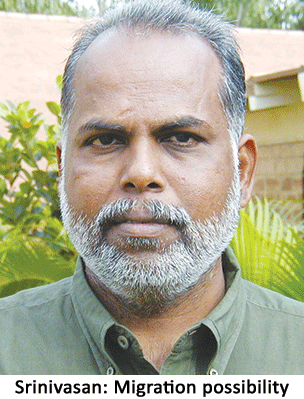 31 and is now an Indore-based education consultant.
31 and is now an Indore-based education consultant.
Sumer Singh’s dissatisfaction with the control-and-command authoritarianism of the CBSE top brass is shared by M. Srinivasan, an alumnus of Mysore and Connecticut universities and founder-principal of the Gifted Education and Research (GEAR) Innovative International School, Bangalore, and also president of the Managements of Independent CBSE Schools of Karnataka (estb.2009) which has a membership of 110 institutions. “The recent circulars emerging from CBSE, relating to the appointment of principals, teachers, tuition fees, staff service conditions etc, have been issued without any consultation with representative associations of affiliated schools and are neither legally maintainable nor good for primary-secondary education. When GEAR School was affiliated with CBSE some 15 years ago, the board had the education of the end users, i.e, children, in mind and we had the freedom to innovate and administer our own schools. But of late we are not consulted about syllabus or administrative fiats issued by the board. The new chairman of CBSE doesn’t have an education background and is a typical prescriptive and punitive bureaucrat. There is now a real possibility of a large number of private unaided CBSE schools migrating to the rival CISCE examination board,” says Srinivasan.
In this context, it must be noted that CBSE, originally established in 1929 as the Board of High School and Intermediate Education of Rajputana (including Ajmer-Merwara), Central India and Gwalior and renamed the Central Board of Secondary Education in 1962, is the country’s largest national school examinations board with 18,006 affiliated schools. In terms of number of affiliated schools, CISCE (estb.1962), the post-independence successor of the University of Cambridge Local Examinations Syndicate (UK) which administered the Senior Cambridge (class X and the class XII Cambridge Higher Secondary) exams
in India right up to the mid-1960s, is a distant also-ran. It has a mere 2,190 schools countrywide affiliated with it.
However, the majority of the country’s most admired private schools including The Doon School, Dehradun, Campion, Mumbai, J.B. Petit, Mumbai, The Valley School, Bangalore and Rishi Valley, Chittoor (Andhra Pradesh) — which are ranked the country’s #1 boys boarding, boys day, girls day, day co-ed, and co-ed boarding primary-secondary schools respectively in the authoritative EducationWorld India School Rankings 2016 — are affiliated with CISCE. Even the country’s premier international schools which also offer Indian curriculums — Dhirubhai Ambani International, Mumbai (international day category) and Good Shepherd International, Ooty (international residential) — are affiliated with CISCE. Indeed the majority of the Top 10 schools in each of ten category league tables of the latest EW India School Rankings 2016 are CISCE-affiliated institutions.
Top-ranked CBSE schools such as Modern School, Barakhambha Rd, Delhi (day-cum-boarding category) and Welham Girls (girls boarding) are the exception, though several CBSE schools are ranked among the Top 5 in each category. Among them: Daly College, Indore, DPS, R.K. Puram and the Lawrence schools in Sanawar and Ooty.
Now with the CBSE management increasingly interfering with the administration of affiliated private independent schools, there’s clear and present danger of a substantial number of them disaffiliating and signing up with the rival CISCE. Particularly since the Union HRD ministry’s inaugural National Achievement Survey 2015 conclusively established that class X students of CISCE-affiliated schools record superior learning outcomes in English, maths, science and social sciences. (see EW June 2016 or http://www.educationworld.in/magazine/more/4934-national-achievement-survey-2015-indias-premier-school-examinations-board).
evertheless, despite being disenchanted with the incremental hyperactivity of the CBSE top management in recent times, principals of highly-ranked affiliated schools are wary about grasping the disaffiliation nettle. As noted earlier, within the teacher and parent communities of CBSE schools, there is deep belief in the advantages of being associated with an exams board close to the Central government. A pervasive socialist mindset and entrenched conviction — notwithstanding a mountain of evidence to the contrary — that government knows best, dissuades promoters, principals and parents of private unaided CBSE schools from seriously contemplating the disaffiliation option.
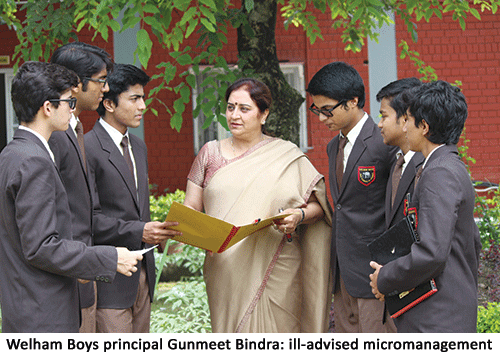 “CBSE is by far India’s largest school examination board and respected not only in India, but abroad as well. Therefore disaffiliation is too drastic a step. Nevertheless it’s mystifying why the CBSE management, which has huge duties to discharge in the domains of syllabus research and formulation, and improving curriculum design and assessment systems, should want to become involved in micromanagement of affiliated private schools. The circulars issued by the board in December are reportedly inspired by the need to ensure that promoters’ family members are not appointed principals. But some promoters’ family members could be highly-qualified educationists. Therefore it’s not advisable to mandate blanket regulations — one cap can’t fit all heads. The CBSE and government need to focus on improving learning outcomes in government rather than private unaided schools. By interfering in the administration of private schools, the CBSE board which has other more pressing duties, has bitten off more than it can possibly chew,” says Gunmeet Bindra, an alumna of the Delhi School of Economics and Calcutta University, founder-principal of DPS, Jalandhar and Kanpur, former principal of Vidya Devi Jindal School, Hisar (2007-11) and principal of the CBSE-affiliated Welham Boys School, Dehradun.
“CBSE is by far India’s largest school examination board and respected not only in India, but abroad as well. Therefore disaffiliation is too drastic a step. Nevertheless it’s mystifying why the CBSE management, which has huge duties to discharge in the domains of syllabus research and formulation, and improving curriculum design and assessment systems, should want to become involved in micromanagement of affiliated private schools. The circulars issued by the board in December are reportedly inspired by the need to ensure that promoters’ family members are not appointed principals. But some promoters’ family members could be highly-qualified educationists. Therefore it’s not advisable to mandate blanket regulations — one cap can’t fit all heads. The CBSE and government need to focus on improving learning outcomes in government rather than private unaided schools. By interfering in the administration of private schools, the CBSE board which has other more pressing duties, has bitten off more than it can possibly chew,” says Gunmeet Bindra, an alumna of the Delhi School of Economics and Calcutta University, founder-principal of DPS, Jalandhar and Kanpur, former principal of Vidya Devi Jindal School, Hisar (2007-11) and principal of the CBSE-affiliated Welham Boys School, Dehradun.
Since Bindra was appointed the first woman principal of Welham Boys in 2011, the school’s ranking in the annual EW India School Rankings league table of boys’ boarding schools has risen from #6 in 2013 to #2 in 2016.
Quite clearly, R.K. Chaturvedi the newly appointed, high-handed chairman of CBSE (who refused to take any calls or even acknowledge a six-point written questionnaire e-mailed to him), and his lieutenants within CBSE are unaware of the damage that will be caused to the board’s reputation and standing if top-ranked private schools revolt and sign up with the rival CISCE board. Ignorance of Supreme Court judgements affirming the autonomy of private unaided education institutions, and ham-fisted interference with the administration of affiliated schools could severely damage the reputation of CBSE in India and abroad.
The writ petition of the Association of Unaided Schools of Rajasthan highlighting the over-reach of this essentially examinations board, is scheduled to be heard by the Delhi high court on February 9. Whatever the verdict of the court, it is likely to serve as an overdue reminder to the CBSE mandarins and the BJP-led NDA government at the Centre, of the advantages of restraint and inadvisability of rushing into a domain where they should tread lightly, and with great circumspection.
De-liberalisation of CBSE
The Delhi-based Central Board of Secondary Education (CBSE) traces its origins to the Board of High School and Intermediate Education, Rajputana established by the pre-independence government of India in 1929. In 1962, the board was reconstituted under the aegis of the Union education ministry and chartered as a pan-India school-leaving examinations board with its main objectives being to “serve the (sic) educational institutions more effectively, to be responsive to the educational needs of those students whose parents were employed in the Central Government and had frequently transferable jobs,” according to the official CBSE website.
After independence with the upsurge of nationalist pride, the popularity of this indigenous examinations board, which offered syllabuses and prescribed textbooks of considerably greater nationalist flavour than the University of Cambridge Local Syndicate which administered the Senior Cambridge and Higher Secondary Certificate exams and later the Anglo-Indian School Board (which has since morphed into the Delhi-based Council for the Indian School Certificate Examinations (CISCE)), increased rapidly with the majority of private unaided (financially independent) schools promoted in the post-independence era preferring to affiliate with CBSE.
Since then, the number of primary-secondaries affiliated with this school examinations board has risen from 309 in 1962 to 18,006 schools (as on September 30, 2016) including 210 in 25 countries. Currently, CBSE affiliates include 1,113 Central government-promoted Kendriya Vidyalayas, 587 Jawahar Navodaya Vidyalayas (Central government co-ed boarding schools for meritorious rural students), 2,635 government aided schools, 14 Central Tibetan and 13,657 private unaided schools. Although in the popular perception CBSE is primarily an affiliating board for government schools, in reality, 76 percent of its affiliated schools are private independent institutions with some such as Lawrence School, Sanawar (estb.1847), Daly College, Indore (1882), Welham Boys, Dehradun (1957) among others, with histories of over a century and nationwide reputation for education excellence.
The rapid growth and popularity of CBSE in the public and private sectors in the first three decades after the board was reconstituted and conferred pan-India status, was due to enlightened educationists and educators being appointed as chairpersons and officials of the board. But in the new millennium after ideologues of the BJP and Congress party — Dr. Murli Manohar Joshi, Kapil Sibal, Smriti Irani — were appointed Union human resource development ministers, the autonomy of CBSE has been steadily eroded despite the HRD ministry website describing CBSE as “an autonomous body working under aegis of the ministry of HRD”.
This dilution of CBSE’s autonomy has been achieved through the simple expedient of appointing members of the twice-born IAS (Indian Administrative Service) — enthusiastic partners of the neta-babu brotherhood which has damaged all institutions of governance of post-independence India — as chairpersons of the board.
“Since the dawn of the new millennium, the board has been changing its affiliation bye-laws frequently to interfere in the management and administration of independent schools. Under its IAS chairpersons, the board has adopted a very controlling, interventionist, prescriptive and punitive attitude towards private schools in which they have no stake,” says M. Srinivasan, promoter-director of the GEAR Innovative International School, Bangalore (estb. 1995) and president of the Managements of Independent CBSE Schools of Karnataka.
Damodar Goyal, founder-president of the Association of Unaided Schools of Rajasthan has gone further. In 2013 on behalf of the association he filed a writ petition (Civil No. 6510 of 2013) in the Delhi high court praying for a declaration that several amendments made by the CBSE management to its affiliation bye-laws are ultra vires (unconstitutional) and beyond the remit of the board. The petition, scheduled to be heard by the court on February 9, also requests the court to define and delineate the powers and jurisdiction of CBSE.
The future growth, development and direction of 13,657 private independent schools affiliated with India’s largest national school-leaving examinations board depends on the court’s verdict.
“CBSE exceeding authority & jurisdiction”
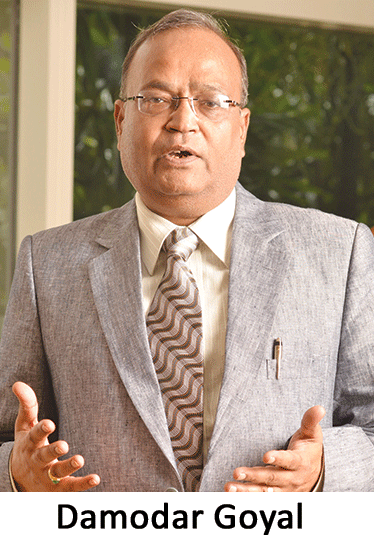 Damodar Goyal is the Jaipur-based president of the Society for Unaided Private Schools of Rajasthan. Excerpts from an interview:
Damodar Goyal is the Jaipur-based president of the Society for Unaided Private Schools of Rajasthan. Excerpts from an interview:
A writ petition filed by you in 2013 under the aegis of the Association of Unaided Schools of Rajasthan against CBSE is pending hearing in the Delhi high court. What are the main prayers in this petition?
To strike down various affiliation bye-laws of CBSE incorporated without authority of law and beyond the board’s jurisdiction. CBSE is a body established by the government of India to conduct secondary school examinations. All other bye-laws related to tuition fees, service conditions of employees, composition of managing and selection committees and applying its bye-laws to classes KG-VIII are illegal and ultra vires.
Last December, CBSE issued two circulars making it mandatory for principals of affiliated private schools to take a Principal Eligibility Test (PET) set by CBSE. A day later, the board issued another circular reconstituting the recruitment committees of all affiliated schools and inserting a nominee of the CBSE chairman and a representative of the state government, both with veto powers. What’s your comment?
These are clear cases of the board exceeding its authority and jurisdiction. Qualifications of principals and teachers of affiliated schools can be prescribed only by the NCTE (National Council for Teacher Education), a body created through legislation by Parliament. Necessary qualifications cannot be prescribed by a mere administrative order. Moreover, imposing the CBSE chairman’s nominee on the selection committee is an unreasonable restriction as held by several Supreme Court judgements.
Some educationists are of the opinion that the CBSE management is misusing its affiliation bye-laws to micromanage affiliated schools and dilute their autonomy. To what extent, if any, do you share this opinion?
I share it absolutely. CBSE is attempting to take control of each and every administrative function of independent schools without authority of law. CBSE is now controlled by bureaucrats rather than educationists. The authoritarian attitude of CBSE bureaucrats has created the current opaque regulatory regime. Surprisingly, there’s only one educationist on the entire board.
Promoters and principals of even top-ranked private unaided CBSE schools are reluctant to speak up openly against the CBSE management for interfering in their internal affairs. What’s the explanation?
That’s because CBSE has become a ‘brand’ and managements of affiliated schools are afraid of losing the value of the CBSE brand. Moreover, most of them have learned to get their work done without offending CBSE officials.
During its two terms (2004-2014) in office at the Centre, the Congress-led UPA government failed to significantly increase the education budget or initiate meaningful education reforms. Are you more optimistic about these issues under the BJP-led NDA government?
The NDA marginally increased the Centre’s outlay for education in 2016-17, which isn’t sufficient for universalising education and infrastructure development. The states need to make greater allocations for education in their budgets for qualitative improvement in primary-secondary education.
In general, how optimistic are you that our education system will be able to bridge the quality and learning outcomes gap and catch up with the Western developed countries?
Except for prime minister Narendra Modi, nobody in the government is serious about catching up with Western countries. For RSS and BJP ideologues, striving to attain global benchmarks and standards in primary, secondary and higher education is equal to betrayal of Indian culture and traditions.
Also read: CBSE to conduct training sessions for schools on new affiliation process















Add comment